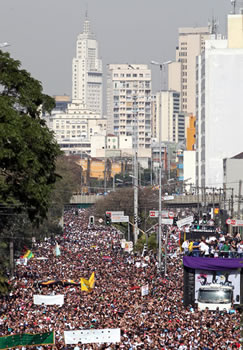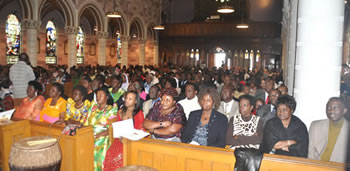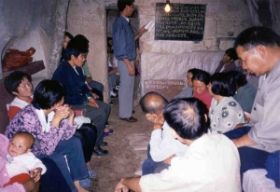From Our Archives
For earlier essays on this week's lectionary, see Dan Clendenin, Though the Fig Tree Does Not Blossom (2010), and Debie Thomas, Doing Faith (2016), and If You Have Faith (2019).
For Sunday October 2, 2022
Lectionary Readings (Revised Common Lectionary, Year C)
Lamentations 1:1–6; 3:19–26 or Habakkuk 1:1–4, 2:1–4
Psalm 137 or Psalm 37:1–9
2 Timothy 1:1–14
Luke 17:5–10
This Week's Essay
I live my life in ever widening circles
that reach out across the world.
I may not complete this last one
but I give myself to it. — Rilke
Thank God for Shadyside Presbyterian Church in Pittsburgh. Back in 1933, they kick-started what eventually became World Communion Sunday, which Christians now observe on the first Sunday in October. In our world of discord and violence, and given Christianity's dismal track record for cooperation, World Communion Sunday is more important than ever.
"Accept one another," writes the apostle Paul, "just as God has accepted you."
In his book that deserves a wide readership, Exploring Protestant Traditions, my good friend David Buschart explores the distinctives of eight Protestant traditions — Lutheran, Anabaptist, Reformed, Anglican, Baptist, Wesleyan, Dispensational, and Pentecostal. I especially like how he begins his book.
When Buschart was about ten, he had a talk with his mother, the gist of which was that whereas his buddies were Catholic, Presbyterian, and Methodist, his mother described his own family as "just Christians." That description satisfied him in some important ways for a while, but later he began to observe a troubling pattern. Nearly every Christian tradition tried to "occupy an ecclesiastical or spiritual high ground as the genuine descendants of Jesus Christ and 'the New Testament church.'" Every fragment of the faith tried to speak for an undivided whole.
 |
|
Brazilian Protestant Jesus Parade 2012.
|
The Jesus movement fragmented early and often. James and John asked Jesus for positions of glory. The disciples argued about who was the greatest. They tried to stop an anonymous healer because "he's not one of us." The Greek-speaking Jews complained about the Aramaic-speaking Jews because their widows were being overlooked in "the daily distribution of food."
About twenty years later, Paul lamented the deep divisions at Corinth. As the decades turned into centuries, some fragments of the faith were erased from history. Others were lost or fizzled out, like Paul's letter to (or from) the Laodiceans that he mentions in Colossians 4:16.
These fragmentations, as Buschart observes, often led to a superiority complex, in which each small part of the Jesus movement claimed to speak for everybody. That, in turn, led to deep divisions that are with us today.
The Eastern Orthodox churches believe that they alone are "the one true church of Christ on earth." Roman Catholics have claimed that "outside the church there is no salvation." One of the earliest expressions of this claim comes from Cyprian (200–258), who wrote that “you cannot have God for your Father unless you have the Church for your Mother.” On November 18, 1302, Pope Boniface VIII wrote in the bull Unum Sanctum, "We declare, say, define, and pronounce that it is absolutely necessary for the salvation of every human creature to be subject to the Roman Pontiff."
Whereas the Orthodox and Catholic traditions place the church hierarchy "above" the Bible and strictly control its interpretation, the Protestant Reformation — with Bibles newly translated into the common vernacular of every day people, placed Scripture directly into the hands of individual believers to read for themselves. This flipped the script, and elevated personal interpretations of Scripture "over" the church hierarchy.
Private interpretation revolutionized the role of the Bible in the church in many good ways, but it also created new problems, namely, the Protestant inclination to radical individualism and sectarian splintering into endless new denominations, each one believing that it parses the truth better than everyone else — the superiority complex that spawns divisions. The Orthodox scholar George Florovsky called this Protestant view of Scripture the “sin of the Reformation."
It's easy to grasp the negative consequences of the fragmentations of the faith. On World Communion Sunday we do well to commit ourselves to the one, holy, catholic and apostolic church that we confess to believe.
 |
|
Catholics in Kenya.
|
On the other hand, the Catholic theologian David Tracy (born 1939) of the University of Chicago sees "fragments" in a positive light. In 2019 Tracy published two volumes of essays, his first new books in twenty-five years. The first volume is called Fragments: The Existential Situation of Our Time. The idea of "fragments" has been a guiding theme in Tracy's long and distinguished career.
According to many astute observers, over the last hundred years, our culture has "fragmented," and this is an unfortunate development that we rightly lament. Tracy quotes TS Eliot as one example: "these fragments I have shored against my ruins." Eliot's poem The Wasteland, says Tracy, is "perhaps the most fragmentary poem of the twentieth century."
But as a practical matter, says Tracy, "all our traditions are in fragments." That's the only way it could be. All human knowledge is limited. No Christian, for example, uses the entire Bible. Everyone has different temperaments, needs, and cultural moments in history. We all choose our intellectual and Biblical fragments for various reasons, and that's not all bad.
No believer can live the entire Biblical tradition, observes Tracy, nor should they even try. That's impossible, and not even necessary. We can only know and live a part of the tradition, and really only a part of the part. And it's liberating to acknowledge this.
Tracy gives the example of our four gospels that tell the Jesus story in four fragmentary ways. Mark says nothing about the birth or resurrection of Jesus. Imagine living in a Markan community with no Christmas or Easter, and then meeting a believer from the Johannine community of the pre-existent Logos, or a Lukan believer who prioritizes social justice from a Gentile perspective.
Tracy defends fragments as "a way to break totalities, to fragment all totality systems and open them to infinity." In his view, "totality closes," it prevents "openness and dynamism." This is precisely the point of the poem by the Israeli poet Yehuda Amichai (1924–2000):
From the place where we are right
Flowers will never grow
In the spring.The place where we are right
Is hard and trampled
Like a yard.But doubts and loves
Dig up the world
Like a mole, a plow.
And a whisper will be heard in the place
Where the ruined
House once stood.
 |
|
Chinese house church.
|
Imagine this simple thought experiment — that you tried to live the eight "fragments" of the Protestant traditions that Buschart explores, or the three traditions that I feature in this week's images — Brazilian Protestants, Kenyan Catholics, or Chinese house churches. You couldn't do it, of course, it's impossible. But it's also enriching to imagine how "absorbing, appropriating, and articulating" those unique fragments would broaden your own narrow horizons.
World Communion Sunday is an opportunity to repudiate our exclusion of people who are different from us: "He was not one of us" (Mark 9:38). Buschart recommends what he calls "theological hospitality." Instead of defaulting to our insecurities about those whom we find strange, different, or fringe, instead of capitulating to ignorance, fear, and "sincere yet uninformed stereotypes" of others, we should celebrate the considerable diversity that exists within our Christian traditions. After all, he observes, one mark of a cult is "enforced conformity," whereas authentic Christianity celebrates our fragments of faith along with our many continuities and commonalities.
NOTE: See Kenneth L. Woodward, "In Praise of Fragments: An Interview with David Tracy," Commonweal (September 25, 2019).
Weekly Prayer
From Jane Wilson Joyce, Quilt Pieces (Gnomon Press, second printing, 2009).
The Liberty Bell in Philadelphia
is cracked. California is splitting
off. There is no East or West, no rhyme,
no reason to it. We are scattered.
Dear Lord, lest we all be somewhere
else, patch this work. Quilt us
together, feather-stitching piece
by piece our tag-ends of living,
our individual scraps of love.
Dan Clendenin: dan@journeywithjesus.net
Image credits: (1) ChristianPost.com; (2) AjabuAfrica.com; and (3) BaptistBulletin.org.





